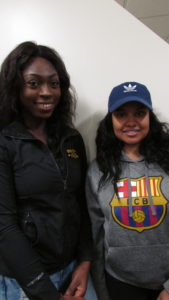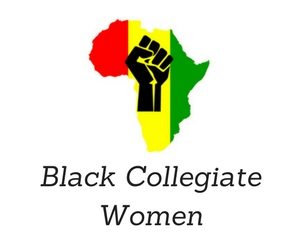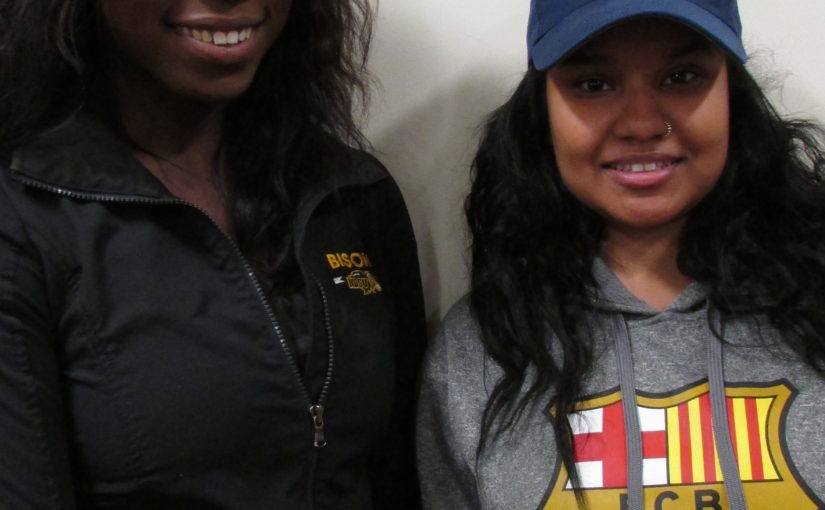Two NDSU students have come together to make an organization, Black Collegiate Women (BCW), for women of color to feel welcome and to talk about the experiences of being a minority.

Creators of Black Collegiate Women (L to R) Edwina Opara and Zainab Ahmed.
Zainab Ahmed is a senior majoring in human development and family science with a minor in women and gender studies. Edwina Opara is a junior majoring in psychology and is also the Vice President of Black Student Association (BSA).
“Black Collegiate Women is built for minority students or minority women on campus that feel like they do not have a voice,” Opara said. “We feel like minorities don’t have a voice, don’t have a place at home. There’s many times where people have said there’s not a lot of resources for them here on campus.”
“I feel like there was kind of like a discrepancy with women and, aside from that, you also have the color that plays into it as well,” Ahmed shared. “So it’s important to me to have resources for future students as well to give back to them here at NDSU, so just to leave something behind that I didn’t have when I first came here.”
Opara brought up the proposal of the organization at the first BSA meeting. During this meeting, more than 15 girls joined. After proposing the idea, she was overwhelmed by women asking about the progress and when it would start. “If so many girls want this on campus — we should be able to create it for them,” Ahmed said.
The idea for the organization, Black Collegiate Women, was in the back of both of their minds, but once Opara mentioned it, Ahmed automatically wanted to help create it.
“I felt a little bit out of place just because I didn’t feel like I had other people that I could connect with,” Ahmed said. “I felt like the school, although NDSU is a wonderful school, I felt like it kind of lacked diversity and I struggled when I first started out here.”
For Opara, her past experiences at NDSU inspired her to create the organization. She began her freshman year in the Reserve Officers’ Training Corp (ROTC), a competitive program, but one that lacks diversity. The fact that she was the only minority and the only African-American student affected her emotionally and mentally, overall giving her a disadvantage.
“For me I didn’t feel like me being the only African-American student being a problem, but I could see other people the way they reacted to me and — the way they spoke to me,” Opara said. “It was every little thing I did, from my hair to just little tedious things.”
“We’re (African-American women) told not to express ourselves. When we encounter those issues in society, it’s like: Why do they have to act like they’re the victim? Why does race matter all the time? Why does slavery still matter? For me, it does matter,” Opara said.

Black Collegiate Women Official meetings start spring 2018.
Opara explained how in society social issues are walked over and they strive to bring social awareness to people, so they see the importance.
“Racism is taught,” Opara said, “Educating people on racism, discrimination, it’s very important for it to diminish from generation to generation. It’s very important for it to go away because if we don’t address things — it’s going to keep popping up in our media.”
“We wanted to address issues, such as skin color, colorism, hair texture, self-image, like how do women of color — how do they view themselves in a society that tells them what’s beautiful and what’s not,” Ahmed shared. “When you look at the magazines, you don’t really see women of color, and that’s not the beauty standard in our country.”
Ahmed then brought up Rihanna’s new makeup line, Fenty Beauty, and how it was and still is a huge deal because it provides 40 different shades that women of color do not receive by other brands. Women of color are discriminated against within the makeup industry, so this was a huge step.
“Black people are one of the only races that are told to hate themselves,” Opara stated.
A problem that struck Opara was, during the interest meeting for BCW, they asked, “How do you feel as an African-American student on campus?” One international student responded she “doesn’t even see herself as a woman first; she sees herself as an international student on campus,” Opara shared.
They went on to discuss how women of color are disadvantaged in two categories: for being a woman and for being a person of color.
“Women are not only are we so degraded, not only are we taught to forget that we’re women and bend our back over for men in our society, but it’s also that we are African-American women — we’re taught to be women of color,” Opara explained.
“When you think about the history of this country, African-American men were able to vote before women in general,” Ahmed said. “That goes to show the privilege of men in general.”
“So, when you think of that aspect and you put the race over top of it, women of color — do go through way more struggles than men,” Ahmed said. She explained that African-American men go through struggles as well, but she feels as though women of color have more to endure.
“We’re (women) not appreciated — not even being seen, not even being appreciated. We give birth to these people — just feeling less than, “ Opara said.
When addressing the election of President Trump, both explained how they think it affected the country negatively.
“With Trump, that represents so much for me,” Ahmed shared. “Aside from being a woman, I am a Muslim American, so just having a president that goes against everything you are basically — I am a woman, I am a woman of color, and on top of that I am a Muslim American — so he basically goes against everything I am. So when you have something like that, it makes you a little bit more careful of how you live your life.
Ahmed explained how it makes people feel unsafe because people are essentially now able to do what they want. However, she also said while it has negatively impacted the country, it has also brought awareness to issues allowing people to now speak out.
Opara considers this a wake-up call, saying it “really reminds minorities in America that they’re hated. In the country that we live in, we’re just another number; we’re not welcome. So for me, I really do feel like, it’s been going on, but more so now. It’s really changing our world and really showing us that if we don’t make change now, when will we ever have time for it?”
Ahmed shared that as a Muslim woman, she experiences being recorded while wearing her scarf or having others shout racial things at her.
In regards to racism on campus, Opara said, “You never really know the depth of a situation until it happens to you; there’s so many people that are fighting against the racism – but at the end of the day – you never know until it happens to you.”
At NDSU, they do see diversity, but as something you can count on your hand, because it is lacking.
Opara explained how this is a place for learning, a place to learn how to prepare for the world and that discrimination does not make sense on campus because those discriminating will have to adapt to diversity in the workplace when they leave college.
They want to work toward not only bringing awareness to these problems, but bringing awareness to women of color. They plan to address many issues of self-image, competition and women of color in general, along with having cultural events and sister circles.
They explained that they want a place where women of color can finally have a home, where they can have a sense of friendship and build a network. The organization is open to anyone because they believe others need to be educated even if they are not women of color.
“When two feminists come together and want to make a change on campus and want to uplift women, there’s going to be success,” Opara said.
The organization is up and running on MyNDSU, but will begin having official meetings spring 2018.
